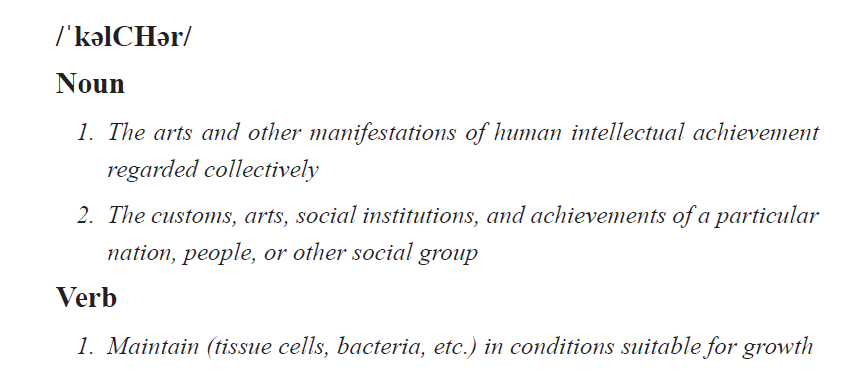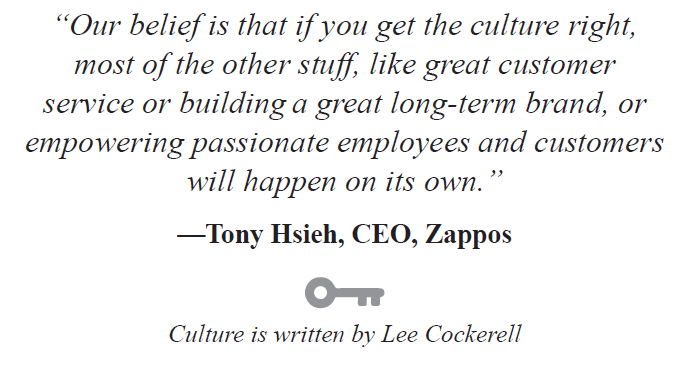Culture



There are lots of books out there to read on how to foster an inclusive culture that touches everyone, a culture that respects everyone, a culture that makes everyone feel special, a culture that treats everyone as an individual, and a culture that provides developmental opportunities for everyone, so that each and every individual can achieve the level of his or her own ability.
Here’s how you can think about workplace culture: while diversity focuses on our differences and similarities, workplace culture focuses on the respect and appreciation we show one another, so no one feels left out.
Feelings are a big deal. If people feel left out, then they are left out.
To put it even more simply, workplace culture is making sure that every- one matters…and that everyone knows that he or she matters.
We make people feel included by talking and listening to them, recognizing them, knowing them well, and developing them. At the least, we assist them with their development by encouraging them and by getting them into the right kind of training.
The problem is that it is not going to work as well unless everyone is doing this. This is a no-brainer because if people feel excluded, whether it is because someone is preoccupied and not paying attention or for some other reason, then the idea of inclusion is lost.
Creating the right culture is one of the main responsibilities of a leader. The great leaders do this especially well. Whether it is at home or at work, the culture matters, and we as leaders have control over that culture. To create a healthy, respectful, trustworthy culture at work, we all need to set the example by paying attention to everybody, by showing respect to everybody, and by being available for everybody who needs to see us. At a minimum, we must find another way to assist them if we are not available.
As everyone continues to learn about the importance of an inclusive culture and goes about practicing being inclusive, we will continue to have a special culture that is crisp, clean, and clear in every way and makes every- body want to stay and have their careers in our organizations.
We all know to some degree how it feels to be excluded. I remember that when I joined a couple of companies in my career, I was excluded because I was not an “insider.”
On one occasion, I was somewhat excluded because of where I was from—Oklahoma—and because I had not received my formal training from the “right” hospitality school. I felt excluded in junior high school from the “in crowd” as well. That may have been my imagination, but that is still the way I felt. This is not a good feeling, and it can take its toll on one’s self-es- teem and self-confidence, which can be key factors in how someone’s life turns out. I have finally recovered!
We need to take this very seriously. We need to pay attention to everyone. Responsibility is not self-serving. It is about the future: the future of the organization, the future of our families, and the future of the people we work with.
Great leaders build up people’s self-esteem and self-confidence. If you have children, you know how important it is to focus on each child in a way that makes each one feel special, which may not be the way to make the others feel special. Think back to when you were a child and how important this was to you. You know it is vital to treat children as individuals and to show complete respect to them and to develop them. It is easy to do with your children because you know them very well, if you are paying attention.
It is the same way with your fellow team members. If you know them well, then you will treat them well. It is also a no-brainer that when people feel respected and valued for the talents and skills they bring to the team, they feel more motivated and inspired, which leads to commitment.
When people are committed, they feel a strong personal connection with the work they do. Every single role at the organization is important. If it is not important, we should not have that role. You will find that the more inclusive your work environment is, the more people will want to be a part of your team. Being known for being inclusive will help you recruit and retain the very best team members, which will help ensure that you get the right business results. Turnover in your group will be extremely low, as will disciplinary problems, sick-day usage, and on and on.
As a leader at home or work, it is your responsibility to create a culture in which everybody can thrive. Here are six tips for accomplishing that:
- Commit to learn more about how to create and manage a culture by reading about the subject. Take seminars on culture to become an expert with a total understanding of your role in this endeavor. The Disney Institute is a great source for this learning.
- Commit to developing the why for this endeavor. Communicate it to all of your team members.
- Commit to be the perfect role model for the culture you are striving to create.
- Commit to total clarity about the importance of creating a culture in which everybody matters and they know they matter.
- Commit to making the hard decision and having the hard conversations to achieve results.
- Commit your learning and strategy to writing. Develop a document everybody can understand and use to learn about the subject of culture and your expectations of their roles and support.
Remember, great leaders build up people’s self-esteem and self-confidence.
